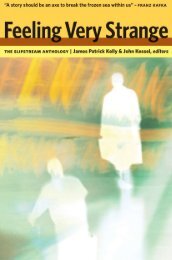The Curse of the Wer.. - Site de Thomas - Free
The Curse of the Wer.. - Site de Thomas - Free
The Curse of the Wer.. - Site de Thomas - Free
You also want an ePaper? Increase the reach of your titles
YUMPU automatically turns print PDFs into web optimized ePapers that Google loves.
WOMEN WHO RUN WITH THE WOLVES<br />
tion <strong>of</strong> <strong>the</strong> romance’s meaning suggests … that <strong>the</strong> women who seek<br />
out i<strong>de</strong>al novels in or<strong>de</strong>r to construct such a vision again and again<br />
are reading not out <strong>of</strong> contentment but out <strong>of</strong> dissatisfaction, longing,<br />
and protest.’ 36 Although Radway also acknowledges that ‘<strong>the</strong> romance<br />
avoids questioning <strong>the</strong> institutionalized basis <strong>of</strong> patriarchal control<br />
over women even as it serves as a locus <strong>of</strong> protest against some <strong>of</strong> its<br />
emotional consequences’, her suggestion that <strong>the</strong> romance interrogates<br />
and seeks to re<strong>de</strong>fine masculinity situates Lackey’s ‘taming <strong>of</strong> <strong>the</strong><br />
wolf’ as a way <strong>of</strong> forwarding <strong>the</strong> feminist argument that men need to<br />
transcend traditional constructions <strong>of</strong> masculinity. 37<br />
While Lackey’s story <strong>de</strong>picts <strong>the</strong> taming <strong>of</strong> <strong>the</strong> wolf/man, o<strong>the</strong>r<br />
romance narratives follow Carter’s focus on unleashing <strong>the</strong> wildness in<br />
women through <strong>the</strong>ir encounters with lycanthropic lovers. <strong>The</strong> <strong>de</strong>sire<br />
for such an experience <strong>of</strong> her sexuality was literalized for a 49-year-old<br />
woman suffering from episo<strong>de</strong>s in which she believed she changed<br />
into a wolf. In <strong>de</strong>scribing her feelings during <strong>the</strong> final episo<strong>de</strong>, she<br />
wrote ‘I don’t intend to give up my search for [what] I lack … in my<br />
present marriage … my search for such a hairy creature. I will haunt<br />
<strong>the</strong> graveyards … for a tall, dark man that I intend to find.’ 38 <strong>The</strong> dark<br />
or Gothic romance/fantasies <strong>of</strong> Tanith Lee, Cherie Scotch, Rebecca<br />
Flan<strong>de</strong>rs, Jane Toombs, Susan Krinard and Donna Boyd follow a similar<br />
logic. Tanith Lee, however, also acknowledges <strong>the</strong> limitations <strong>of</strong> such<br />
a mo<strong>de</strong>l for <strong>the</strong> attainment <strong>of</strong> feminine autonomy in Heartbeast (1992).<br />
Laura is ‘exhausted by <strong>the</strong> world, with its portents and omens, its snows<br />
and imprisoned wolves and imprisoned women, its fairy tales.’ 39 After<br />
marrying a man who loves her because she ‘did not have <strong>the</strong> strength<br />
to beat him <strong>of</strong>f’, she takes a lover, a werewolf. 40 <strong>The</strong> passion she feels,<br />
however, passifies and ensnares her, ra<strong>the</strong>r than liberating her, and<br />
only <strong>the</strong> <strong>de</strong>aths <strong>of</strong> both her husband and her lover enable Laura to find<br />
herself, and to exercise autonomy.<br />
Lee’s ‘Wolfland’ (1983), also based on Little Red Riding Hood,<br />
explores similar territory. Lisel (<strong>of</strong> <strong>the</strong> red cloak) is a beautiful, marriageable<br />
nineteenth-century heiress, but at 16, she is sufficiently<br />
wilful to imagine that she might not marry. Consequently, when her<br />
strange, frightening grandmo<strong>the</strong>r suggests to her that an ‘irrevocable<br />
125





